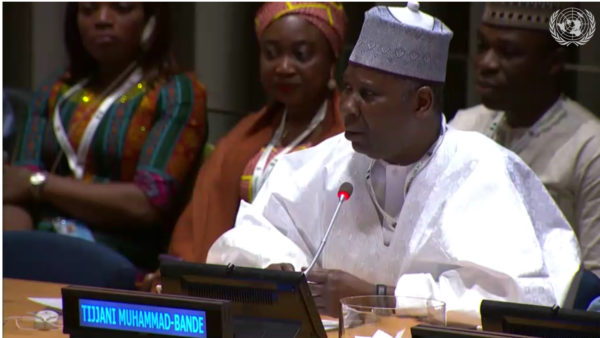The emergence of Prof. Tijjani Muhammad–Bande as President of the 74th Session of the UN General Assembly, UNGA, is a reflection of the confidence in Nigeria’s ability to direct the affairs of the global institution.
This is the position of the Federal Government as issued by the Acting Spokesperson of the Ministry of Foreign Affairs, Mr Friday Akpan, in a statement in Abuja.
He described the development as a positive one for Nigeria.
Muhammad-Bande was elected on Tuesday through acclamation at the 87th plenary of Assembly in New York.
He was the only candidate for the UNGA position.
Muhammad-Bande is the second Nigerian to hold the office after Joseph Garba, a retired military officer and diplomat.
Garba was in the office between 1989 and 1990.
Ahead of election session, President Muhammadu Buhari on Sunday sent a Federal Government delegation to support Muhammad-Bande.
The Permanent Secretary, Ministry of Foreign Affairs, Amb, Mustapha Sulaiman, led the delegation which includes the Director-General, National Intelligence Agency, Amb. Ahmed Rufai Abubakar; Executive Secretary, Petroleum Technology Development Fund, Dr. Bello Aliyu Gusau; and Senior Special Assistant to the President on Media and Publicity, Malam Garba Shehu.
President Buhari expressed confidence that Nigeria’s Presidency of the 74th session of the UN General Assembly would provide a unique opportunity for Nigeria to lead the global call to tackle the political, social, economic and environmental challenges facing the world.
The Presidency explained that Nigeria looks forward to working with UN member states to promote international peace and security, prevent conflict, strengthen global action to tackle climate change, ensure inclusion, human rights, and empowerment of youth and women.
Nigeria, it added, would build on progress made under Ecuador’s Presidency of the 73rd Assembly led by María Fernanda Espinosa Garcés, and further promote key themes that President Buhari had championed on the global stage since 2015, which included climate change, combating terrorism and violent extremism, and establishing functional anti-corruption mechanisms to assist countries like Nigeria recover and repatriate stolen funds.














